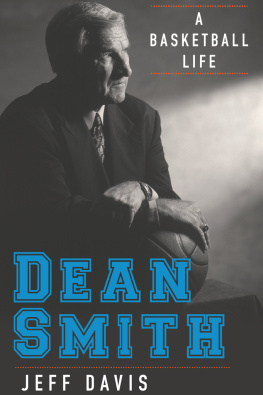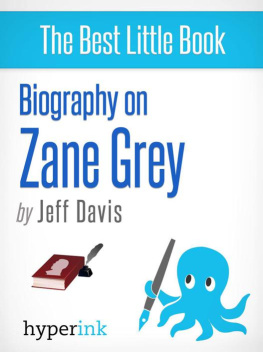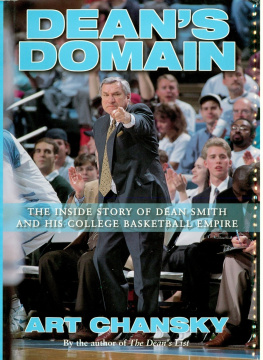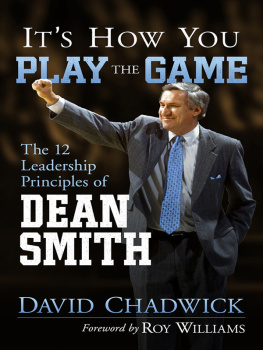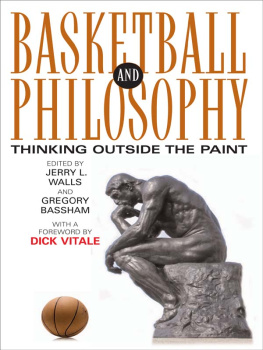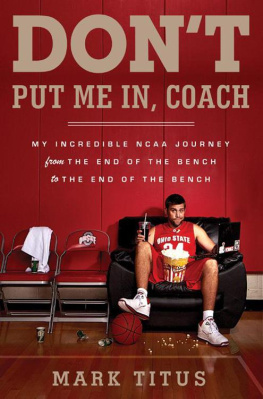ALSO BY JEFF DAVIS:
Papa Bear: The Life and Legacy of George Halas
Rozelle: Czar of the NFL
Chicago Bears: Yesterday & Today


Mention of specific companies, organizations, or authorities in this book does not imply endorsement by the author or publisher, nor does mention of specific companies, organizations, or authorities imply that they endorse this book, its author, or the publisher.
Internet addresses and telephone numbers given in this book were accurate at the time it went to press.
2017 by Jeff Davis
All rights reserved. No part of this publication may be reproduced or transmitted in any form or by any means, electronic or mechanical, including photocopying, recording, or any other information storage and retrieval system, without the written permission of the publisher.
Book design by Amy King
Library of Congress Cataloging-in-Publication Data is on file with the publisher.
ISBN13 9781623363604 hardcover
ISBN13 9781623363611 e-book

We inspire health, healing, happiness, and love in the world.
Starting with you.
RodaleWellness.com
This book is dedicated to Kris, my remarkable wife and
best friend; our children, Elisabeth Davis Case and
Erik Davis; grandsons Will and Charlie Case; son-in-law
Dan Case; daughter-in-law Deb Davis; and Rex Lardner,
a devoted follower of all sports, college and pro, and close
friend since our days at NBC in the 1970s.
CONTENTS
INTRODUCTION
The Good, the Bad, and the Ugly
Wednesday, November 20, 2013, was a significant day at the White House, especially for the gathered families and friends of 16 distinguished citizens whom President Barack Obama honored in a late-morning East Room ceremony as recipients of the Presidential Medal of Freedom. The Presidential Medal of Freedom is the highest civilian honor an American can earn.
President John F. Kennedy launched the award a half century before, in 1963, a few months before he was assassinated. Kennedy was honored with a posthumous medal in a special ceremony on December 6 that yearjust 2 weeks after his deathby the new president, Lyndon Johnson. Johnson awarded a second posthumous medal that day, to the late Pope John XXIII. They were joined by 29 other honorees, among them architect Ludwig Mies van der Rohe; Polaroid photography inventor Edwin Land; economist and founding father of the European Union Jean Monnet; and Felix Frankfurter, the retired Supreme Court justice.
Among the 2013 honorees a half century later were former president Bill Clinton; Kennedys close friend and confidant 92-year-old Ben Bradlee, the longtime editor of the Washington Post; activist, actress, and talk show host Oprah Winfrey; late astronaut Sally Ride; late senator from Hawaii and World War II hero Daniel Inouye; former senator Richard Lugar of Indiana; activist and author Gloria Steinem; and two dominant sports figures, both born in 1931, who would come of age in the 50s as America entered the civil rights era, its time of greatest change since the end of World War II. They were 82-year-old Ernie Banks, the Hall of Fame Chicago Cubs infielder, who called the award the greatest moment of his long life; and Dean Smith, a basketball player in mid-20th-century championship years at the University of Kansas who gained renown as a coaching legend and civil rights activist at the University of North Carolina at Chapel Hill. Smiths teams won a then record 879 games in a 36-year run that began in 1961, shortly after Kennedy took office, and ended when the coach stepped down in 1997 during the Clinton administration. To break it down, Coach Smiths Carolina teams won 20 or more games in 30 different seasons, 27 of them consecutively, made 23 straight NCAA tournament appearances, reached 11 Final Fours, and captured 17 Atlantic Coast Conference (ACC) championships in addition to two national titles.
The White House medal ceremony provided a rare good day for Dean Smith, even in absentia. In his remarks, President Obama noted that Coach Smiths teams won two national championships, that he was named coach of the year several times, that he retired as the winningest mens basketball coach in history, that he was a dedicated civil rights advocate, and that the graduation rate of his players over the years was more than 96 percent. President Obama then added his regret that the coach could not attend due to an illness that he is facing with extraordinary courage. The debilitating illness that overhung the occasion for Smith was a particularly nasty form of the usually protracted and always fatal Alzheimers disease.
Dean Smith was an unabashed Christian liberal who quietly but firmly supported and devoutly practiced racial understanding dating back to his childhood in tightly conservative Topeka, Kansas. A lifelong Democrat, his friendships crossed party lines without prejudice or rancor. Underneath this delightful personality is steel, said Republican Bill Bunten, Smiths best friend from Topeka through high school, college at the University of Kansas (KU), and afterward to the end of his life. If he doesnt agree with you, he wont argue, Bunten told me the summer before Smith died. You play together, and it works.
Another great friend from their time at Topeka High through and after their KU days was former Republican senator Nancy Landon Kassebaum Baker. Dean was a very open person, and I admired the leadership he exhibited in so many ways, particularly the caring for athletes in the sports arena, Baker said. That was so true in high school when he stood up for the black players who could not play and he said, If they arent playing, we wont play.
Kansas never played Kentucky in Deans time in school. He didnt make a big deal about it. Thats the way he felt, Baker recalled. Plus, he was on friendly terms with Kentuckys coaching legend Adolph Rupp, a Kansas alum who for decades was called a racist. Rupp never signed a black player until he landed the troubled 7-foot-1 Tom Payne at the end of his career. Payne played one season, until he was dismissed for low grades and was later arrested and convicted as a serial rapist.
Like Smith, Rupps coach at Kansas was the famed Dr. Forrest Phog Allen. Also, like Smith, Rupp was a substitute under Allen. In their head-to-head coaching competition, Smiths North Carolina Tar Heels beat Rupps Kentucky Wildcats five times against two losses. Smith is the only coach at a major school whose teams had a winning record against Kentucky, a crushing 13-and-3 dominance over his career in Chapel Hill.
At Carolina, Smith personally integrated Chapel Hill restaurants and public facilities and, with Charles Scott, made integration in basketball stick at North Carolina and also the heretofore pale-skin-only Atlantic Coast Conference. As to his excellence as a coach, Smith had been a member of the Naismith Memorial Basketball Hall of Fame in Springfield, Massachusetts, since 1983. That honor came 14 years before he stepped down as coach in Chapel Hill.
Smiths pastor from the time he arrived in Chapel Hill in 1959 with his then wife, Ann, and their three children was Dr. Robert Seymour, who was just organizing the Olin T. Binkley Memorial Baptist Church, a liberal congregation. He had a gift of being able to relate to everyone regardless of their service, regardless of who they were, Dr. Seymour said of Smith when we spoke in 2015. The athletic record is outstanding. His legacy will live always when people talk about basketball, Dr. Seymour stated. I think the many public references will stand up through the years. He was inspirational and universally admired.

